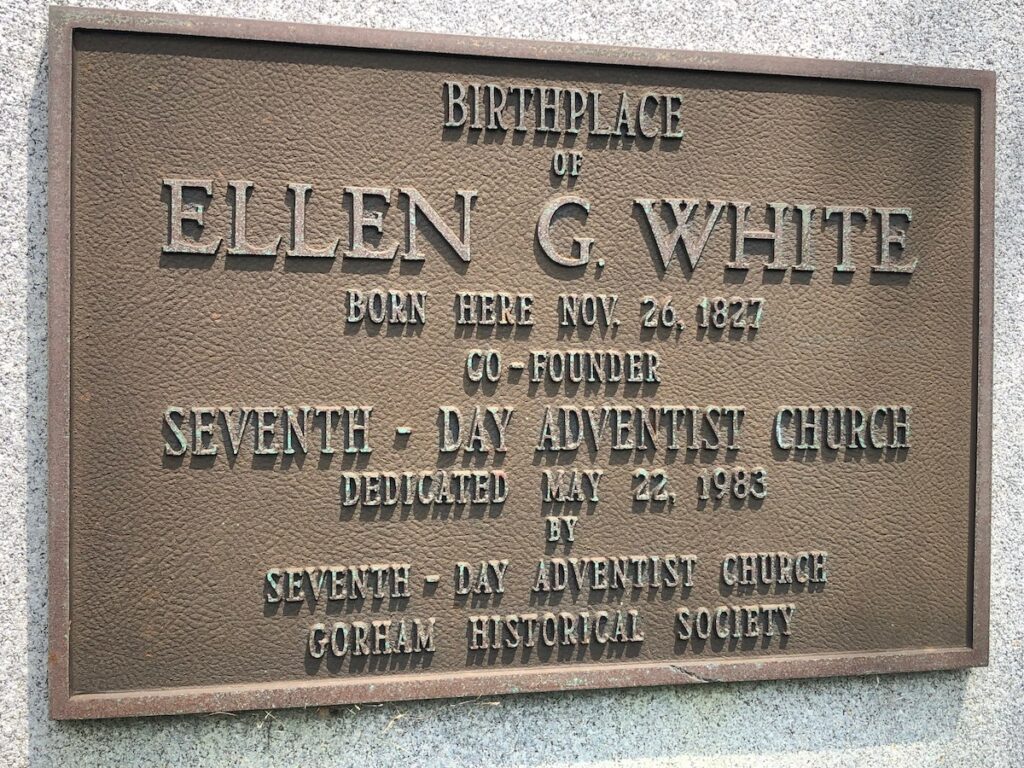
For many years Adventists from all over the world have been making pilgrimages to see the location on Fort Hill where Ellen G. White was born. While there have been fewer visitors since 2020, due to the COVID-19 pandemic, people still seek out the granite marker which former Gorham resident John Tewhey placed in its current spot on the edge of his front lawn about twenty years ago, near the intersection of Fort Hill Road and Valley View Drive.
Ellen G. White (1827-1915), born Ellen Harmon in Gorham, is still remembered today as one of the most influential people who ever lived in Gorham. In fact, when Smithsonian Magazine published a list of the 100 most influential Americans of all time, her name was included, along with such luminaries as Abraham Lincoln, Thomas Edison, and Dr. Martin Luther King Jr.
The Smithsonian list included White as one of America’s top ten historical religious leaders, primarily because she was the co-founder and longtime leader of the Seventh Day Adventist church. In addition, after she moved to California later in life, she co-founded Loma Linda University, as well as the renowned medical facility that is now known as Loma Linda Medical Center and Medical School.

This modern-style portrait of White is part of a mural mounted on the outside wall of Amato’s in Gorham
White is also remembered as a visionary in the area of health food and veganism. This is despite her having no formal training in nutrition or medicine. It is hardly an exaggeration to state that anyone who enjoys cereal products such as granola, graham crackers, and cornflakes should thank Ellen G. White.
Not many people realize that White is probably the person most responsible for introducing and promoting these items in the American diet and that those innovations influenced the diets of countries around the world. White’s books on diet are not often read today, but her ideas influenced current Adventist cookbooks like “The Ten Talents” by Rosalie Hurd (1968), which is still in print in an updated version.
Ellen Harmon was born in the Fort Hill area of Gorham almost 200 years ago, on November 26, 1827. Not long after her family relocated to the west end of Portland in the late 1830s, she endured a traumatic experience when a classmate threw a rock that hit her on the head and knocked her out. She was in a coma for several weeks and suffered a facial injury that affected her for many years.
She had her first religious experience at age twelve at a Methodist camp meeting in Buxton, then experienced her first vision in 1844 while visiting friends at 120 Ocean Avenue in South Portland, a location where Taco Trio restaurant is now located.
Ellen Harmon married an itinerant Millerite pastor named James White in 1846. They spent the next nine years traveling and preaching throughout New England and New York State, as their movement grew.
Shortly after Ellen G. White and her husband moved to Battle Creek, Michigan in 1855, they were among the four people who incorporated the Seventh Day Adventist Church, founding a denomination which now has approximately 20 million adherents worldwide.
The Whites were not alone in their move to southwest Michigan, as many other people seeking a healthier lifestyle found their way to Battle Creek, which was an early hotbed of vegetarian and health-oriented thinking, as well as a center of the Adventist religion.
In 1868, White reported having a divine vision, after which she came to believe that a completely vegetable-based diet was the correct lifestyle for all people. For the rest of her life she worked to spread that message, although it took more than two decades for White to become completely vegan herself. During those intervening decades, White followed a compromise vegetarian diet which sometimes included eggs, dairy, and fish.
The Adventist church began sponsoring a health and wellness resort which was named the Battle Creek Sanitarium by Dr. John H. Kellogg after he was hired as director of the facility, a position he held from 1875 to 1943.
Kellogg’s brother William founded the Kellogg Toasted Corn Flakes company in 1876, as a way of implementing Ellen G. White’s vision of creating commercial vegan alternatives to America’s meat-based diet, especially regarding breakfast. In the following decades others affiliated with the Adventists or the Sanitarium (such as cereal entrepreneur C. W. Post) went on to introduce numerous vegan or vegetarian products for breakfast and other meals, such as Post Toasties, GrapeNuts, and Postum coffee substitute. Other Adventist-related enterprises introduced the first commercial Granola, first canned soy milk, and the first nut-based meatless patties.
Today, various estimates state that between 60% and 70% of Adventists continue to follow Ellen G. White’s example of living a mostly or completely vegan lifestyle. Public health researchers often cite the city of Loma Linda as one of healthiest communities in the United States, due to the high concentration of Adventists.


